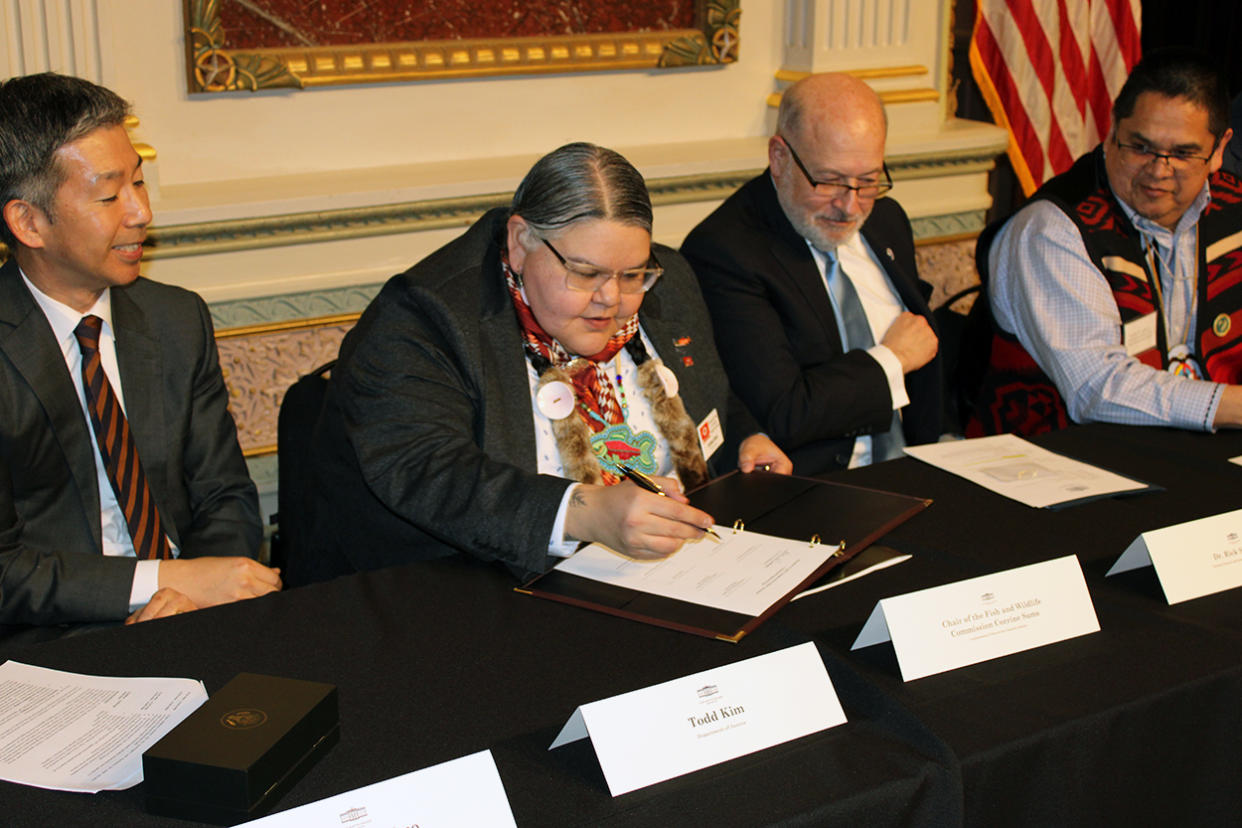Tribal Leader Lauds Federal Report on Harms of HydroDams on Columbia Basin Tribes

In a groundbreaking federal report released on June 18, the U.S. government has, for the first time, admitted that the construction of dams on the Columbia and Snake rivers has had detrimental effects on the Columbia Basin tribes.
Corinne Sams, a Member at Large of the Confederated Tribes of the Umatilla Indian Reservation (CTUIR) Board of Trustees, welcomed the report's findings. "It is the first time the federal government tells the truth about how the construction of the dams on the Columbia River devastated salmon runs, inundated tribal villages, important regional gathering and trading centers, sacred sites, burial grounds, and fishing areas that tribes depended upon for subsistence and trade,” Sams — who also chairs the CTUIR’s Fish & Wildlife Commission and the Columbia River Inter-Tribal Fish Commission — said in a statement.
Sams emphasized that the government-built dams not only led to the drastic decline and extinction of some salmon runs but also made it extremely difficult to rebuild these runs and exercise treaty-reserved fishing rights. She described the Tribal Circumstances Analysis (TCA) as “an honest acknowledgment” of the “devastating impacts of development of the Columbia Basin on tribes,” highlighting the transfer of the region’s wealth from tribes to non-Indians. She added that the TCA would serve as a foundation for future analyses of proposed federal actions or funding involving the hydrosystem, salmon, or tribal resources in the basin.
The TCA identifies the Confederated Tribes of the Warm Springs Reservation, Nez Perce Tribe, Yakama Nation, Coeur D’Alene Tribe, Shoshone-Bannock Tribes of the Fort Hall Reservation, Spokane Tribe, and Confederated Tribes of the Colville Reservation as the tribes most immediately impacted by Columbia River dams and reservoirs.
Since ancient times, basin tribes have relied on the river's resources, especially salmon, integral to their cultures, identities, and sustenance. Historically, up to 16 million salmon and steelhead returned to Pacific Northwest tributaries annually. However, dam construction beginning in the early 20th century blocked fish migration into certain basin reaches, flooding sacred sites, burial grounds, and thousands of acres.
The TCA details how tribal communities lost access to fish, altering their diets, depriving them of traditional lifeways, and changing how they teach and raise children in their cultural and spiritual beliefs. The report also provides recommendations for upholding the U.S. government’s treaty and trust responsibilities. These include integrating the inequities tribes have suffered from dam construction into future National Environmental Policy Act reviews, pursuing co-stewardship and co-management agreements, continuing efforts to consolidate tribal homelands, and incorporating Indigenous knowledge into decision-making.
Sams expressed satisfaction with the TCA, noting that it fulfills a commitment made in the Resilient Columbia Basin Agreement (RCBA) between the U.S. government and the Six Sovereigns (CTUIR, Yakama Nation, Nez Perce Tribe, Warm Springs Tribes, and the states of Washington and Oregon). The RCBA seeks to restore salmon populations in the Lower Basin, expand tribally sponsored clean energy production, and provide stability for communities relying on the Columbia River for agriculture, energy, recreation, and transportation.
“The TCA is a remarkable document and a demonstration of the (Biden) administration’s commitment to restore the salmon runs and the ecosystems they depend upon in the Columbia Basin,” Sams said. “We are confident that our partnership with the U.S. government will succeed in restoring our salmon runs, while at the same time meeting our needs for decarbonization and clean energy that does not kill fish and providing for the transportation, irrigation, and recreation needs of our region.”
About the Author: "Native News Online is one of the most-read publications covering Indian Country and the news that matters to American Indians, Alaska Natives and other Indigenous people. Reach out to us at editor@nativenewsonline.net. "
Contact: news@nativenewsonline.net

